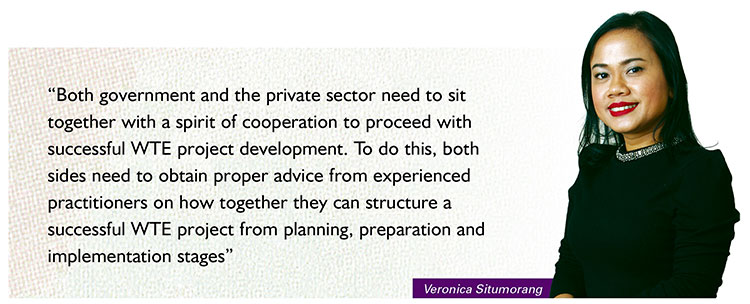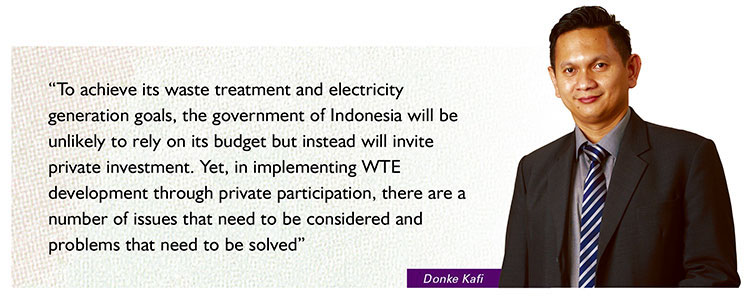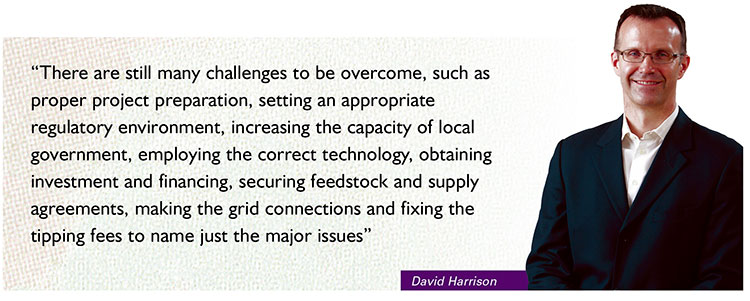Building a WTE power plant requires a huge amount of funds to be invested, but, with limited government funding available, other financing sources are badly needed. Veronica Situmorang, Donke Kafi and David Harrison of DK & Situmorang Lawyers explain the options.
The Indonesian government has expressed a strong desire to develop and invest in renewable energy—especially from municipal solid waste.
Indonesia’s population continuously shows significant growth. In 2015 the population reached 255 million people. It had increased by more than 108 million people over the last 35 years. In terms of the economic condition of the country, according to the Asian Development Bank, currently the growth has reached 5.2% and is projected to reach 5.5% in 2017.
Those two factors will contribute towards increased consumption and the generation of more waste. This will lead to further environmental, public health and sanitation problems, as well as contributing to flooding.
In terms of the amount of waste produced, an article in the October 9, 2015 edition of the Jakarta Post estimated an average person in Indonesia produces 700 grams of waste per day. With 250 million people, a staggering 175,000 tonnes of waste is produced each day, amounting to 64 million tonnes per year. Taking into account the amount of waste involved, proper waste management in every municipality is badly needed.
Currently, municipal solid waste (MSW) has to be disposed of in government-run landfill or final disposal sites (TPAs). This waste has not been processed in an advanced way with advanced technology such as incinerator, thermal process, RDF etc. Not only would such advanced technology will considerably help manage waste but also will generate something else useful for community. Transforming waste to energy (WTE) is a case in point. WTE technology can be a major contributor to both the needs of proper waste management as well as contributing to overall electricity needs in Indonesia—as currently Indonesia has targeted to reach 35,000MW of electricity generation by 2019.
Building a WTE power plant requires a huge amount of funds to be invested. Traditionally any infrastructure development is funded by the government budget. However, the government budget alone is insufficient to make it happen in Indonesia. According to a recent case study of the Indonesian Planning Board (Bappenas) taking Bandung municipality as an example, Bandung has a local budget of only Rp67 billion per year, while a WTE project based on incinerator technology requires an investment of approximately Rp1,600 billion. Hence, other financing sources, such as from the private sector, are badly needed.
Indonesia has just recently started developing municipal WTE facilities and started inviting the private sector to get involved. Yet there are still many challenges to be overcome, such as proper project preparation, setting an appropriate regulatory environment, increasing the capacity of local government, employing the correct technology, obtaining investment and financing, securing feedstock and supply agreements, making the grid connections and fixing the tipping fees to name just the major issues.
WTE development will not only help to clean up a city but also contribute to ever-growing electricity needs. This article will provide a brief overview on some fundamental legal aspects and ways of developing WTE power plants through private investment in Indonesia.
Public-private partnership regime
One way to invite private participation to develop WTE power plant is through a public-private partnership (PPP) mechanism. The PPP regime in Indonesia is basically governed by Presidential Regulation No 38 of 2015 on PPP (PR 38/2015). Yet, this regulation is not sole regulation to be followed. Such development shall also comply with: 1) Sectoral Regulations in Energy and Waste Management, 2) Inter-sectoral Regulations which govern cross-cutting issues and 3) Regional/local regulations.
PPP projects are known to have two kinds of projects namely Solicited and Unsolicited Projects. A solicited project is a government-led project and an unsolicited project is private-led project.
In a solicited project, there are three project phases comprising: 1) planning; 2) preparation; and 3) implementation.
The planning stage involves the identification and selection of potential PPP projects—including a decision by the government on how a WTE project would be funded. Once decided that a WTE project shall proceed under PPP mechanism, the government will plan the budgeting activities.
The project preparation stage is intended to obtain an initial assessment of the feasibility of the project (Pre-FS) and to set out the government support and guarantee plan, the return of investment mechanism and the land acquisition plan.
The project implementation stage involves several activities to draw up the contractual arrangements required to move the project forward, including the launching of a tender to select the private entity that will carry out the project, the cooperation agreement and financial close.
In the case of an unsolicited project, such project can be initiated by a private entity if the project:
- can be integrated into a master plan in the relevant sector;
- is economically and financially viable; and
- has a project initiator with sufficient financial capacity to fund the project.
The approval process begins with the appointment of a private entity as Candidate for Project Initiator. Then the Project Initiator submits the project feasibility document to the government.
PR 38/2015 states that private entities should be selected through open tendering or directly appointed (applicable for both solicited and unsolicited projects). In the case of unsolicited project, the government may give compensation to the Project Initiator in any of the following forms:
- adding 10% to value of the total evaluated bid score;
- paying compensation for the Feasibility Study (FS) carried out by the Project Initiator in the event that the project is cancelled or not implemented for whatever reason; or
- allowing the Project Initiator to change the tender, if, according to the result of the open tender, there are better bids from other business entities (the “right to match”).
 WTE development acceleration regime To accelerate WTE development, the government has issued Presidential Regulations No. 18 of 2016 on acceleration of WTE development in seven cities namely Jakarta, Tanggerang, Bandung, Semarang, Surakarta, Surabaya and Makassar.In order to develop the plan, the government contracting agency (GCA), which is the head of the municipality, may assign its regional-owned enterprises (BUMD) or enter into a cooperation with private entity through a direct appointment.The assigned BUMD or appointed private entity must fulfil the business licensing requirements of power supply, but they will gain acceleration of the process to be issued a direct investment permit on construction, where the activity to begin the construction can be done simultaneously with the arrangement of IMB and environmental permit. According to this regime, the National Power Company (PLN) has been assigned to offtake the electricity from WTE power plant. PLN shall sign the power purchase agreement (PPA) within 35 working days from the date of assignment to BUMD or appointment to private entity. Cross cutting issues GG means a guarantee in the form of financial responsibility taken on by the GCA through the guarantee agreement. The GG is awarded by the MoF through the Indonesian Infrastructure Guarantee Fund (IIGF). When implementing a GG award under PR 78/2010, the IIGF draws up and signs a guarantee agreement with the private entity (the insured). The regulation also stipulates that a minimum guarantee agreement should contain the following provisions:
|
 Government support According to PR 38/2015, in addition to the GG, the government may also provide support to the project, defined as any financial support and/or others supports awarded by the GCA and/or MoF based on its authority, in order to increase effectiveness and financial viability of a PPP project.The form of financial support may include tax incentives, exemption from import duties and partial support for construction. Relating specifically to the form of partial support for construction, the government has enacted Ministry of Finance Regulation No. 223/KM.011/2012 on Provision of Feasibility Support by Funding Part of the Construction of Infrastructure Project for Public Private Partnership Project on Infrastructure Provision (MOFR 223/2012).Government non-financial support may be provided in various ways depending upon the nature of the project. In the case of WTE projects, the most commonly sought type support required is licensing, though other forms of support may also be needed. Land acquisition It should be noted that, under PR 38/2015, there is a provision for the cost of land acquisition to be paid in advance by the GCA and then to be reimbursed by the winning bidder. Accordingly, there is now an opportunity for the private sector to fund land acquisition, with the cost of this being repaid by the GCA through state or regional budget (APBN/APBD). Tipping fees In accordance with Law 18/2008, the government and regional government is obliged to finance waste management activities from APBN/APBD. While the law 18/2008 requires the regional government to provide a budget to manage its waste, in particular in the form of the Tipping Fee, it has been found to be the case that a number of municipalities will find it difficult to provide the budget, given the limited overall budget at their disposal. In addition, there is no such legal basis on how the tipping fee would be calculated. Hence, determining the amount of tipping fees in the absence of a strong legal basis would normally require parliamentary approval. Offtake and feed-in tariff
Permits and licensing In the case of WTE project under acceleration regime (PR 18/2016), the provisions for permits and licensing shall refer to the Presidential Regulation No 03 of 2016 concerning National Strategic Project (PR 03/2016). According to PR 03/2016, in order to start a National Strategic Project, the private entity shall obtain the following licenses:
Those licenses are submitted to the central one-stop service (PTSP Pusat). The construction may commence when location permit, environmental permit and construction permit have been obtained. PTSP Pusat shall process the permits or licensing within five working days, except for the following permits/licenses:
|
 Key considerations for action In the above we have discussed that Indonesia badly needs proper waste management that can help clean cities and add value. Using technology that may transform waste into energy is one of the most important objectives that should be sought. However, this will not be cheap.To achieve its waste treatment and electricity generation goals, the government of Indonesia will be unlikely to rely on its budget but instead will invite private investment. Yet, in implementing WTE development through private participation, there are a number of issues that need to be considered and problems that need to be solved. It should also be that WTE development projects in this area are covered by numerous laws and regulations in Indonesia, which have had the effect of making it not easy to implement such development.While there are challenges, there is a strong belief that WTE development in Indonesia will flourish. The push factors for these beliefs are the need to realise clean cities through proper waste management systems and the need to fulfil electricity demands of as much as 35,000MW by 2019. Another push factor, especially for private sector is an opportunity to generate lucrative incomes which can come from tipping fees and power purchase agreements. In light of the above, both government and the private sector need to sit together with a spirit of cooperation to proceed with successful WTE project development. To do this, both sides need to obtain proper advice from experienced practitioners on how together they can structure a successful WTE project from planning, preparation and implementation stages. In all of those stages, legal aspects play important roles as Indonesia is known to have a wide variety of regulations. It is therefore unlikely for a project developer to easily understand the regulatory environment. Aside from the legal and regulatory concerns, the financial aspects to be considered are the Capex and Opex of the project as well as calculation of the breakeven point and return on investment. Technical aspects to be considered are the appropriateness of the technology for the specific project and its location. Nevertheless, even with all these questions, WTE projects in Indonesia have every chance to flourish if properly planned, financed and constructed. –––––––––––– |


